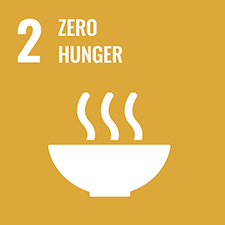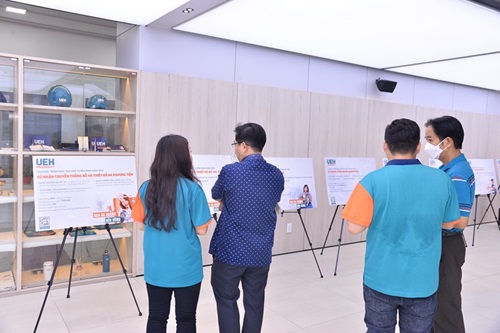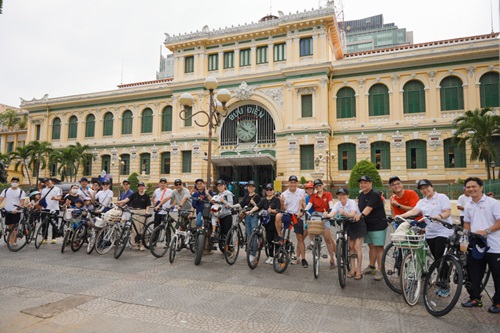Knowledge Transfer Programs for Farmers and Food Producers
30 Nov, 2023
In 2023, the University of Economics Ho Chi Minh City (UEH) initiated a series of programs, seminars, and partnerships to facilitate knowledge sharing and transfer for farmers and food producers, promoting sustainable community development.
Workshop on Sustainable Orange Cultivation in Vinh Long Province
On November 24, 2023, at the UEH Vinh Long Campus, the Vinh Long Union of Science and Technology Associations, in cooperation with relevant agencies, organized a workshop titled “Sustainable Orange Cultivation in Vinh Long Province.” The workshop aimed to support orange growers by reducing risks, aligning cultivation with zoning plans, and finding scientific solutions to enhance quality and yield for cooperatives and small-scale farmers. Recommendations were made on following VIET GAP and GLOBAL GAP standards, organic production, and establishing a geographical brand for Vinh Long oranges, contributing to green, sustainable economic growth aligned with climate change adaptation.
At the workshop, experts discussed current challenges and sustainable solutions for orange cultivation in the area, including overcoming soil degradation and enhancing the value of agricultural products. Participants also addressed difficulties faced by local farmers, including market instability, lack of export opportunities, and limited post-harvest storage.
Field Surveys and Group Discussions with Farmers in Son La and Dong Thap
The project “Core Skill Development for Agricultural Workers in Vietnam’s Digital Transformation Era,” led by the Health and Agricultural Policy Research Institute (HAPRI) at UEH and the Vietnam National University of Agriculture (VNUA), is supported by the Australian Centre for International Agricultural Research (ACIAR) and the John Dillon Fellowship at the University of New England. The objective of the project is to develop a framework for agricultural labor capacity and core skills, identify gaps and shortages in core skills and competencies for workers; and provide information and feasible pathways to improve core skills and competencies for mango farmers in the context of digital transformation in Vietnam to serve Vietnam's mango exports in the future.
Within the framework of the project, the units conducted in-depth interviews with exporting enterprises in Son La and the Mekong Delta (MD) on the requirements for exporting mangoes. In addition, the Institute organized group discussions with components in the mango export chain on difficulties in the production process in general and digital transformation in agriculture in particular.
Specifically, from March 2 to 4, 2023, VNUA conducted field surveys with mango farmers in Son La Province, evaluating digital literacy in farming. Representative of HAPRI Institute, Mr. Vu Ngoc Tan was also present to support the delegation in completing the questionnaire and learning from experiences to organize the survey in the Mekong Delta. HAPRI subsequently conducted surveys with export-oriented mango farmers in Dong Thap. Data collected from both locations will be included in the final project report.


During the days in Son La province, the delegation conducted exchanges and surveys with mango growers in Mai Son and Yen Chau districts. With the support of local officials and village chiefs at the research site, representatives of farmers growing and selling mangoes in Hat Lot and Chieng Mung communes of Mai Son district and Chieng Hac and Sap Vat communes of Yen Chau district.
During the working sessions, the survey team shared and listened to the wishes of mango growers and sellers about the difficulties in cultivation, as well as in the use of technological equipment in the digital transformation process. The research team also appreciated the cooperation and support of the government and people of Son La province to successfully complete this survey.
In Dong Thap, from February 16-17, 2023, HAPRI organized 02 group discussions in Cao Lanh district and Cao Lanh city to serve the project "Developing core competencies and skills for agricultural workers in the context of digital transformation in Vietnam". The project is part of the institute's series to promote digital transformation in agriculture and health in Vietnam.
Mr. Vu Ngoc Tan, a researcher at HAPRI, a key member of the project, had a meeting with Mr. Nguyen Khac My, leader of the Agricultural Service Center (ASC) of Cao Lanh district, Mr. Le Chi Hieu, leader of the ASC of Cao Lanh city, farmer Nguyen Van Mach (Vice Chairman of Minh Tam Association), Mr. Vo Tan Bao (Director of Tinh Thoi ASC), and representatives of farmers and the Farmer' Association at My Xuong Cooperative, Cao Lanh district and Tinh Thoi Cooperative, Cao Lanh city. The meeting aimed to learn about the current production situation, the linkage between actors in the mango export chain and awareness of digital transformation in the locality.
At present, My Xuong Cooperative and Tinh Thoi Cooperative are two key mango producing localities in Dong Thap. The three main types of mango grown include Cat Chu mango, Hoa Loc mango, and green-skinned Tuong mango, of which Cat Chu mango accounts for the majority of total output. The two cooperatives are piloting electronic diaries to serve farm management and traceability. In addition, My Xuong Cooperative is also piloting an automatic sprinkler irrigation system and Tinh Thoi Cooperative is starting to apply organic production, aiming to improve soil and improve product quality, gradually reducing chemical fertilizers, increasing organic fertilizers, and using drugs to replace chemical drugs.
Strengthening Local Collaboration through Practical Programs
Aligned with its mission to foster cooperation with localities and connect scientific knowledge to practical issues, the School of Government at the University of Economics Ho Chi Minh City (UEH) organizes annual student trips as part of its partnership with regional communities. These trips create opportunities for students to gain hands-on experience while sharing insights and scientific advancements in governance.
This year, based on a Memorandum of Understanding (MOU) between CELG and the Center for Technology Transfer of Services and Community Development in Agriculture and Fisheries (FACOD-VIETNAM), students participated in a practical program at the People’s Committee of Thua Duc Commune in Ben Tre Province. Here, they explored a community tourism model and learned about the value chains of local agricultural and aquaculture products. Thua Duc, located in Binh Dai District, offers abundant resources for diverse agricultural activities and ecotourism, with a 14-kilometer coastline that supports a thriving clam industry. Managing clam harvesting sustainably is a key focus for the local government, given its importance to the region's economy. Additionally, the sandy soil in Thua Duc is well-suited for crops like watermelon and radish, making it an ideal location for developing community-based experiential tourism.

 Throughout the visit, students listened to presentations by local officials on the management and organization of community tourism models, with an emphasis on sustainable practices and the use of ecological resources. They also engaged in activities like tree planting and conducted surveys with local farming households to understand the value chains of various agricultural products. The trip offered a valuable opportunity for students to learn about international development efforts, including the United Nations Development Programme (UNDP)’s initiatives to develop community-based ecotourism in the coastal area of Thua Duc Commune.
Throughout the visit, students listened to presentations by local officials on the management and organization of community tourism models, with an emphasis on sustainable practices and the use of ecological resources. They also engaged in activities like tree planting and conducted surveys with local farming households to understand the value chains of various agricultural products. The trip offered a valuable opportunity for students to learn about international development efforts, including the United Nations Development Programme (UNDP)’s initiatives to develop community-based ecotourism in the coastal area of Thua Duc Commune.
News and photos: Department of Marketing and Communications, Department of Research Management - International Cooperation








